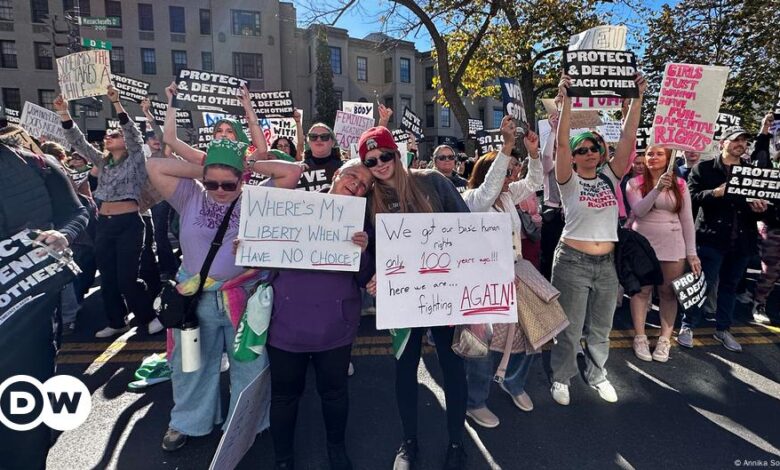Trump’s US: Women’s emotions range from anger to relief – DW – 11/12/2024

These American women couldn’t be further apart in their viewpoints: Mia Akins is a student involved in the anti-abortion movement in Florida.
Molly, a mother from California who prefers not to publish her full name, flew across the country to Washington to express her frustration after the election.
Donald Trump’s victory in the US presidential election has triggered strong emotions among women in the US.
“I’m definitely happy that Trump won, but even more so that Harris and Walz didn’t win,” Mia Akins, a third-year student at Florida International University in Miami and co-founder of the Students for Life of America (SFLA) group at her university, told DW.
SFLA is a nationwide organization in which students are committed to strictly opposing abortion.
Democratic candidate Kamala Harris and her running mate Tim Walz had spoken out in favor of a right to abortion in the US, whereas Donald Trump, during his first term, nominated three of the Supreme Court justices who overturned the nationwide right to abortion.
Trump may not be the strongest pro-life candidate, Akins said, explaining that he wants to leave the issue of abortion to the states instead of supporting a national ban.
Still, the student is optimistic: A Trump administration “is something we can work with,” she said.
LGBTQ+ community fears for the future
However, Molly and her child Sammy think that Trump is not an ideal candidate.
In a spontaneous action, the two took their homemade protest posters and flew from the West Coast to the East Coast to join a demonstration in Washington.
Molly says she is concerned about the changes a Trump administration could make, including the rights of people who are part of the LGBTQ+ community.
Her child Sammy is non-binary, identifying as neither male nor female. Sammy uses they/them/their as pronouns instead.
“I’m worried that Trump as president will roll back LGBTQ rights, limit who they can love, who they can be,” the mother told DW.
Meanwhile, the family is already feeling the impact.
As Sammy will attend college next year, the two have ruled out universities in states that have voted Republican in the majority.
“I’m afraid that my LGBTQ friends can’t go to their dream school for fear of being attacked,” Sammy told DW.
Restrictions on reproductive health care for women?
Trump’s Republican party has not only won the presidential election but also the majority in the US Senate.
There will also likely be a Republican majority in the lower chamber of the US Congress, the House of Representatives, starting on January 20.
As a result, the governing party will be able to push through many of its projects with relative ease.
“Typically we say checks and balances mitigate overwhelming power but we would certainly expect more conservative policies, and more restrictive health care laws impacting women specifically under this second Trump term,” Laura Merrifield Wilson, associate professor of political science at the University of Indianapolis, told DW.
“If Republicans maintain the house, the party will have dominance at a federal level and there is concern from the left that the Project 2025 agenda will become a reality,” she added.
Project 2025, also known as the 2025 Presidential Transition Project, is a very conservative roadmap for the future of the US.
Trump himself has not been personally involved in drafting potential steps, such as banning abortion pills and replacing federal civil servants with Trump loyalists. Still, many of his former associates are members of the Heritage Foundation, a conservative think tank responsible for Project 2025.
‘Feminist resistance to fascism’
The Women’s March Initiative, which organized the protest march with almost half a million people in Washington the day after Donald Trump’s first inauguration in 2017, is still active.
On the Saturday after the election, Molly, Sammy and other protesters rallied in front of the Heritage Foundation building.
A few hundred mainly female participants demonstrated with loud music and green bandanas that read “Bans off our bodies.”
Ahead of the protest, Tamika Middleton, managing director of Women’s March, said in an organizing call that “our mandate is feminist resistance to fascism.”
“We’re mad,” Erica, who also asked not to publish her last name, told DW.
The 27-year-old joined the protest together with her mother Mandy and her five-year-old daughter Elani. “We’re here to show her [Elani] how to not just stay home and be angry,” she said.
Mandy is deeply worried about her granddaughter’s future in the US. “She should have the same reproductive rights we had,” Elani’s grandmother told DW.
Golden times for anti-abortion activists
Meanwhile, other women are very hopeful about the upcoming Trump administration and the next generation.
“I’m incredibly grateful that Kamala Harris with her abortion extremism wasn’t voted into office,” Reagan Barklage, national field director at Students for Life of America, told DW.
“I hope he [Trump] can work with Congress to protect children’s lives,” she added.
Barklage would like Trump to strictly regulate the distribution of abortion pills and hopes that he will “make wise choices for judges.”
The US president nominates federal judges whom the Senate must confirm.
As Trump’s Republicans hold the majority in the Senate, Trump will likely be able to appoint a large number of conservative federal judges who are willing to restrict abortion rights.
For Mia Akins, Reagan Barklage and the Students for Life of America, bright times are on the horizon.
This article was originally written in German.




